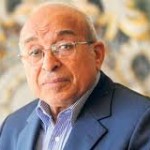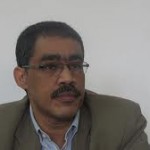Columnists in several Egyptian newspapers have explored different subjects, yet all relate to President Morsy, the Muslim Brotherhood and the Supreme Council of Armed Forces.
Some commentaries recall the history of the Muslim Brotherhood and its rise to power, while others stress the continuing conflict between the Islamist parties and SCAF in the context of a chaotic political scene.
In other pieces, columnists dissect the latest visit of the Tunisian president Monceif Al-Marzouky, and his meeting with Morsy, shedding light on the common background of both leaders being once prisoners, now presidents.
 Can the President abstain from work?
Can the President abstain from work?
Hamdi Kandil
Al-Masry Al-Youm
Recounting his meeting with the Tunisian president Moncef Al-Marzouqi during his last visit to Cairo, Hamdi Kandil draws some lessons from the Tunisian political transition process.
While having major ideological disagreements with his political rival Rachid Al-Ghannouchi, Al-Marzouqi admits to having a longstanding history of mutual understanding, and communication with the current Tunisian Prime Minister, when both men were in exile following Zin Al-Abedine Ben Ali’s political crackdown against Islamists and secular opposition in 1991.
Kandil praises Al-Marzouqi’s statement that the accord between democrats and the Ennahda movement had only been reached when extremists from both sides had been put aside.
He compares this principle, which has effectively put Tunisia on the correct transitional path, to the more complex situation in Egypt, where the role of the presidency is lost between the junta, the remnants of the ousted regime, the media, and the endless power struggle between the Muslim Brotherhood and the liberal forces.
While Al-Marzouqi’s unprecedented abstention from work helped him to eventually claim back some of his presidential capacities initially lost to the Ennahda-controlled parliament, a similar step by Morsy would have certainly backfired in light of the complex Egyptian context, in which extremists are not being marginalised from the political discourse.
 Mr. President, you made a mistake!
Mr. President, you made a mistake!
Fahmi Howeidi
Al-Shorouk newspaper
Recalling Morsy’s statements in Saturday’s issue of Al-Sharq Al-Awsat newspaper, Fahmi Howeidi chides the president for saying that Egypt stands neutral towards all Palestinian factions.
He condemns how the Egyptian stance has always preferred to stress its neutrality towards conflicting issues, while in reality it remains fully biased against Hamas in the Gaza Strip.
It is politically known that Mubarak was a strategic treasure for Israel, and so claiming to be impartial is hardly to be believed even after Morsy’s election to the presidency.
It is understandable that Morsy would speak about the importance of Egypt’s national interest and gathering around the Palestinian cause but Howeidi finds it difficult to see how the former equates Israel’s security coordinators with the victims of this coordination.
Egypt after the revolution will not stay neutral, in Howeidi’s views, especially with regards to the Palestinian file.
The writer regards Morsy’s claimed neutrality as prejudiced, in a situation where the lines between fiction and reality need to remain clear.
The writer associates his criticism of Morsy’s statements to an older article in published in the Al-Hayat pan- Arab newspaper, in which a Saudi writer has called upon the Muslim Brotherhood to stay objective with regards to the Palestinian conflict.
Maybe Morsy’s latest statement is connected to this Saudi advice.
 It is not a boxing match
It is not a boxing match
Emad Al-Din Hussien
Al-Shorouk newspaper
Even after the election of Mohamed Morsy as Egypt’s first chosen president, the political arena has been divided between two sides, tantamount to a boxing match.
Each team strives to knock the other out, where it is better to consider the contest a zero-sum game.
Emad Al-Din Hussein argues that Morsy and all Islamist parties are facing off with the Supreme Council of Armed Forces (SCAF) in a continuingly bitter power struggle.
The former asserts it has won legitimacy through the parliamentary and presidential elections, calling the other team to revise the results of the ballot box.
SCAF’s, however, contends that the Muslim Brotherhood should stay obedient to the letter of the law.
Hussein recalls the verdict of the Constitutional Court to disband the parliament followed by the Appeals’ Court’s dissociation in examining this decision.
Since then, supporters of Islamist parties have been pushing the president to issue his own addendum to the constitutional declaration, and in so doing, completely detach SCAF from power.
On the other side, SCAF, which includes some extremists, call upon the military to restore power over the country and detain the president.
Wrapping up his column Hussein confirms that the political solution to this power struggle should not be treated as a question answered with a yes or no.
Both parties have to reach satisfactorily towards their role in power.
 From prison to presidency
From prison to presidency
Ahmed Mansour
Al-Watan newspaper
Comparing the Egyptian President Mohamed Morsy to the Tunisian Moncif Al-Marzouki, Ahmed Mansour highlights the ideological differences in both leaders, yet asserts that both have reached their presidencies after once being prisoners.
Both presidents recall the experience of Nelson Mandela who has been in prison for more than 30 years.
Mansour expresses his hopes that the Arab spring will continue to elect presidents of this kind.
The writer then looks back at Morsy’s imprisonment history, observing that he has been detained during Mubarak’s era for seven months in 2006 and then was arrested famously on the January 28, 2011 with 34 other heads of the Muslim Brotherhood.
As for the Tunisian President, he is known to be one of the fierce opponents of the ousted President Zain Al- Abedin Bin Ali who has arrested the former in March 1994 for about four months.
Al-Marzouky was set free only after the then South African President Nelson Mandela intervened in his case.
He then continued to play an actively role in the field of human rights, fleeing to Paris from 2001 until Bin Ali’s ouster in 2011.
Mansour ends his article asserting that Arabs, who have witnessed nation-wide revolutions, have chosen their new leaders to be one of those who countered their former presidents.
It is not important that the president is an Islamist or a leftist, but to be a revolutionary is what counts.
 An old-new article on the Muslim Brotherhood
An old-new article on the Muslim Brotherhood
Diaa Rashwan
Al-Masry Al-Youm
In an attempt to reiterate the solution to the question surrounding the Muslim Brotherhood, DiaaRashwan recalls his article posted in Al-Ahram newspaper in 2006.
There are three crucial points that require thorough examination in Rashwan’s view, which help to understand the evolution of the Muslim Brothers as a peaceful Islamist political movement.
First, Rashwan dates back the emergence of political Islam in Egypt two centuries prior to the founding of the Muslim Brotherhood Society by Hassan Al-Banna in 1928, namely when Al-Azhar scholars succeeded in counteracting Napoleon Bonaparte’s rule over Egypt, and brought Muhammad Ali Pasha to power.
Rashwan suggests that the brotherhood were the natural heirs of Al-Azhar’s scholars, the Urabite revolutionists, and the Islamic revival movement led by Muhammad Abduh in the early twentieth century.
Rashwan, on the other hand, recounts the limited mobility granted by the post-1952 regimes to the brotherhood, whereby the latter suffered severely at times as they escalated their confrontation with the state.
He visualises a situation where the natural presence of the brotherhood in Egyptian society can be used constructively for the benefit of the entire nation.
This is the hoped alternative to the ways in which the brotherhood’s relationship with the state has caused so much social polarisation.



